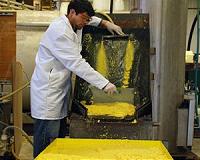 |
Sydney (AFP) May 25, 2011 Producing commercially viable quantities of aviation biofuels is a viable option for Australia and New Zealand and could cut greenhouse gas emissions by 17 percent, a new report said Wednesday. "Flight Path to Sustainable Aviation", commissioned by companies including Air New Zealand, Boeing, Qantas and Virgin Australia, added that such a move could generate 12,000 jobs over the next 20 years. Compiled by CSIRO, Australia's national science agency, the report estimated that using biofuels made from non-food crops would reduce Australia's reliance on aviation fuel imports by Aus$2 billion (US$2.1 billion) a year. "This study highlights promising options for the aviation industry," said project leader Paul Graham, a CSIRO (Commonwealth Scientific and Industrial Research Organisation) economist. "It also identifies the market, infrastructure and governance changes that will be required for success. "Through the uptake of sustainable bio-derived jet fuel, together with next generation aircraft and engines, the industry can reduce both its emissions and its reliance on imported fossil fuel." Some biofuels have been criticised for drawing on vital food crops, land and water resources, but the CSIRO scenario deals with non-food biomass sources such as forestry residues, municipal waste and algae. Several airlines have tested biofuels, including Continental Airlines, Air New Zealand, and KLM. The International Energy Agency estimates that biofuels will make up about 30 percent of global aviation fuel supplies by 2050.
Share This Article With Planet Earth
Related Links Bio Fuel Technology and Application News
 Iowa engineer scales up process that could improve economics of ethanol production
Iowa engineer scales up process that could improve economics of ethanol productionAmes IA (SPX) May 24, 2011 Iowa State University's Hans van Leeuwen has moved his research team's award-winning idea for improving ethanol production from a laboratory to a pilot plant. Now he knows the idea, which produces a new animal feed and cleans water that can be recycled back into ethanol production, works more efficiently in batches of up to 350 gallons than on a lab bench. "We're learning we can reliably p ... read more |
|
| The content herein, unless otherwise known to be public domain, are Copyright 1995-2010 - SpaceDaily. AFP and UPI Wire Stories are copyright Agence France-Presse and United Press International. ESA Portal Reports are copyright European Space Agency. All NASA sourced material is public domain. Additional copyrights may apply in whole or part to other bona fide parties. Advertising does not imply endorsement,agreement or approval of any opinions, statements or information provided by SpaceDaily on any Web page published or hosted by SpaceDaily. Privacy Statement |